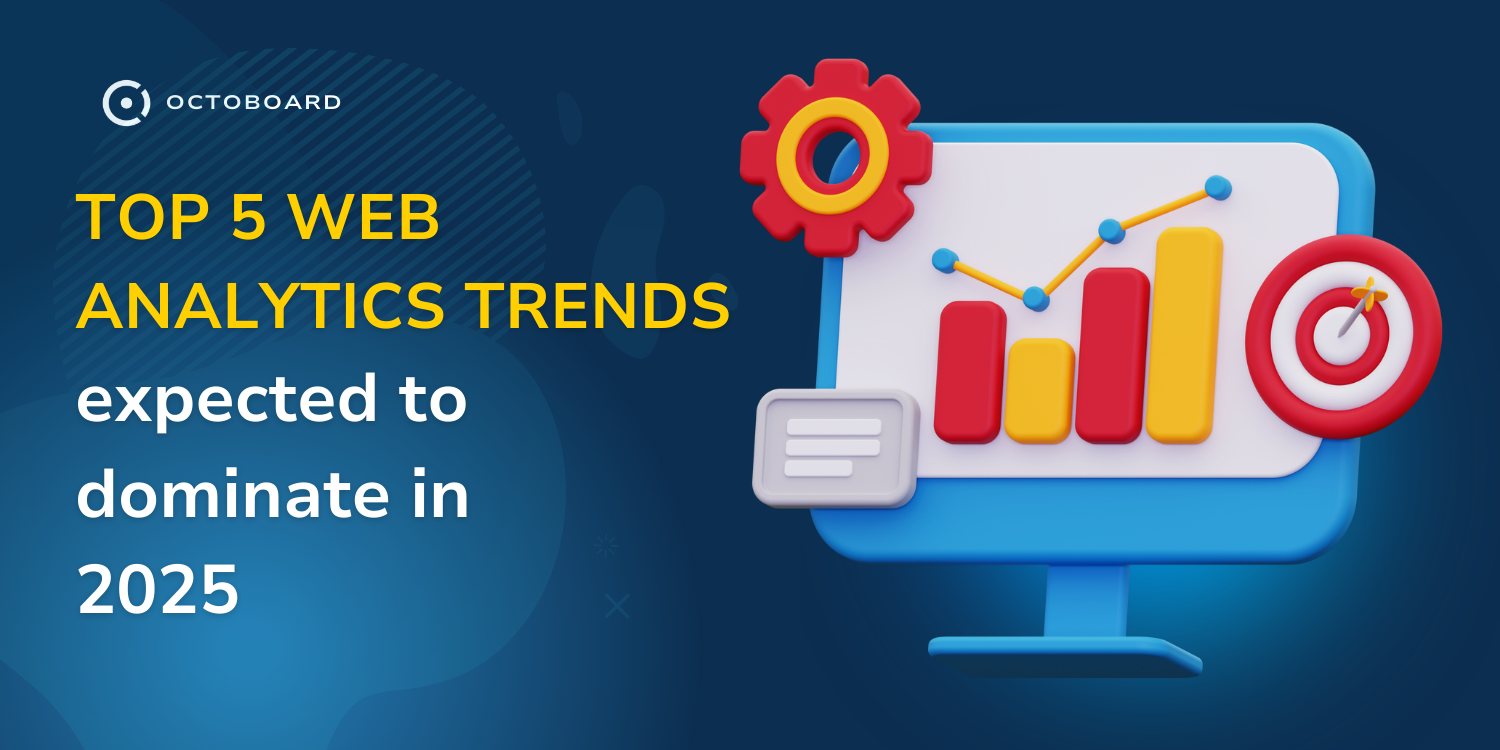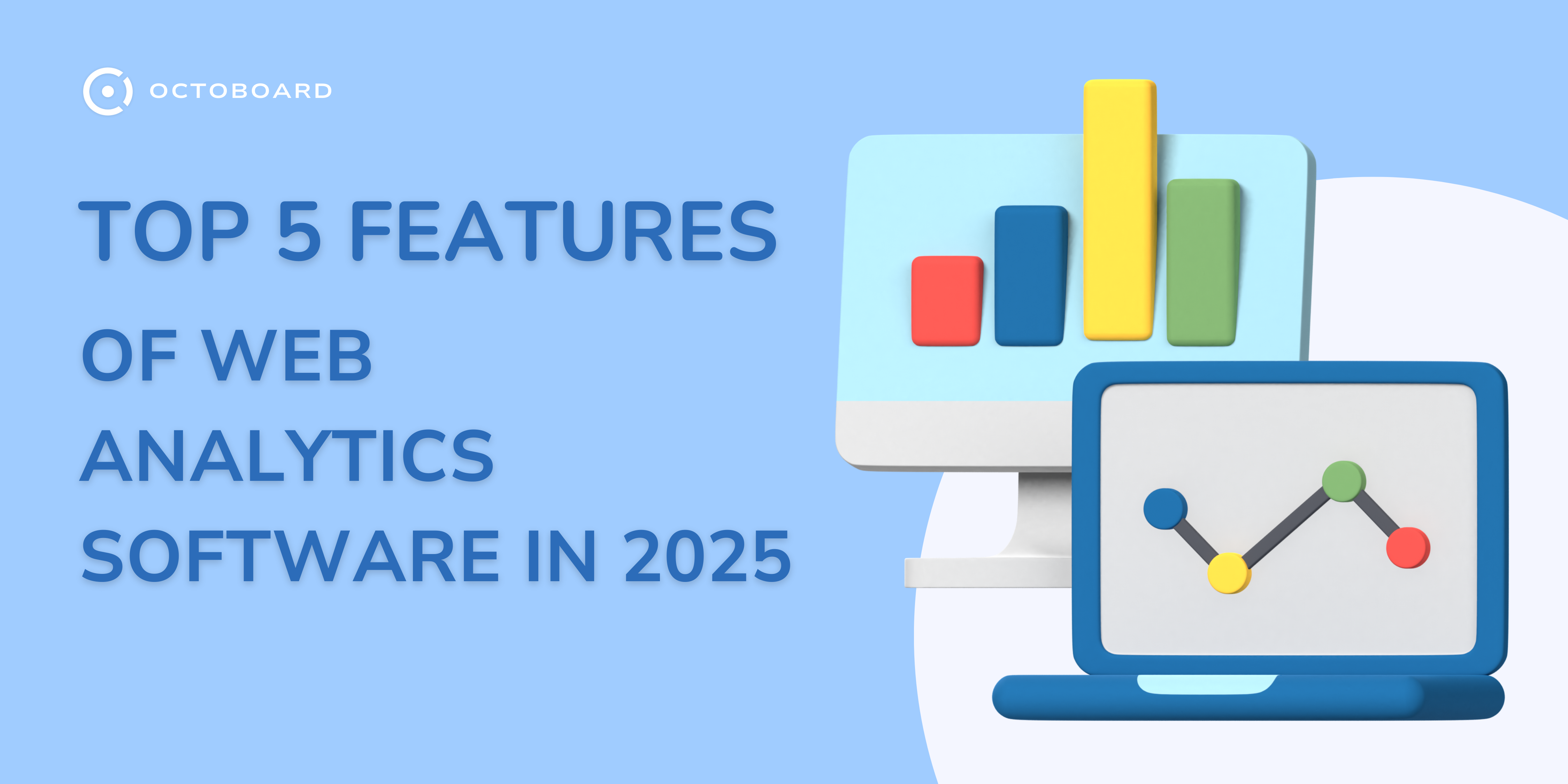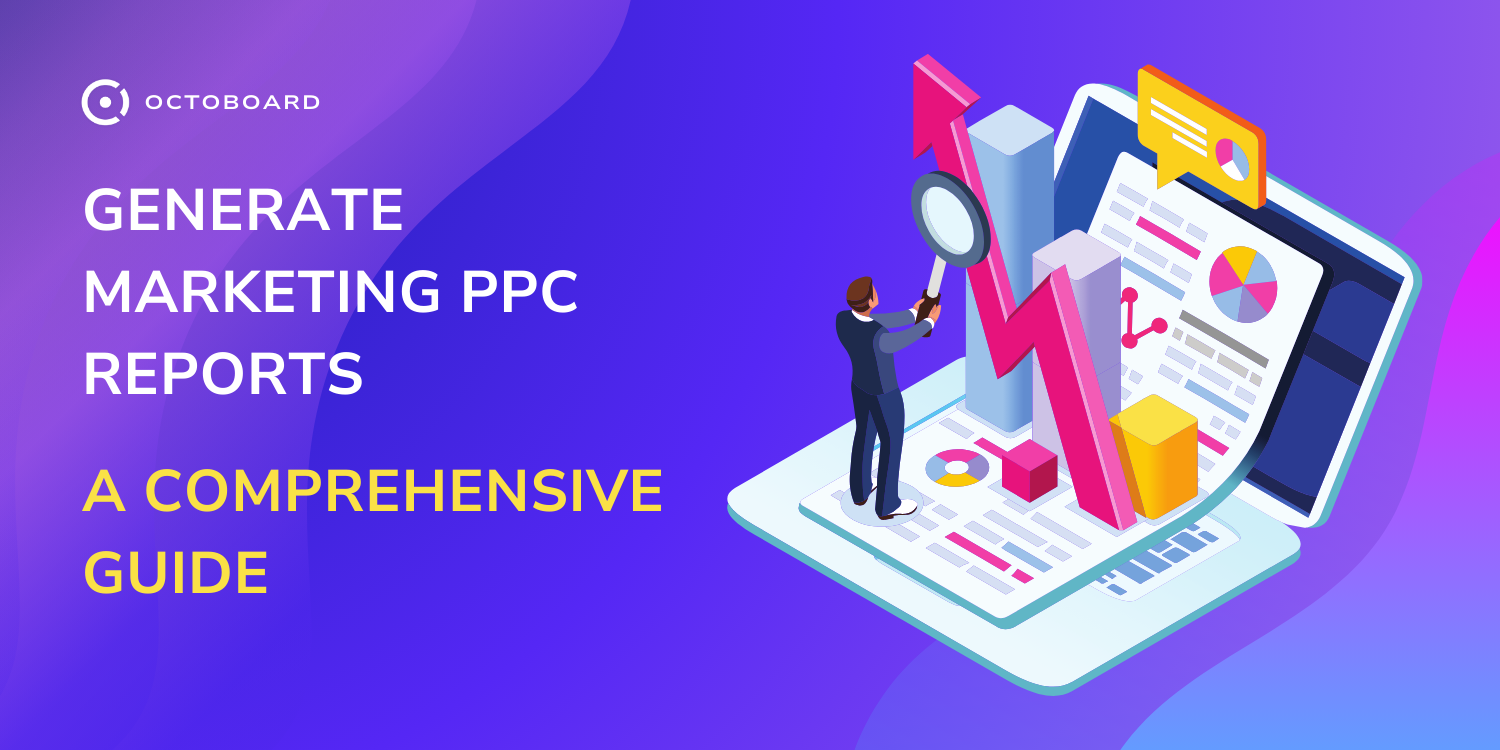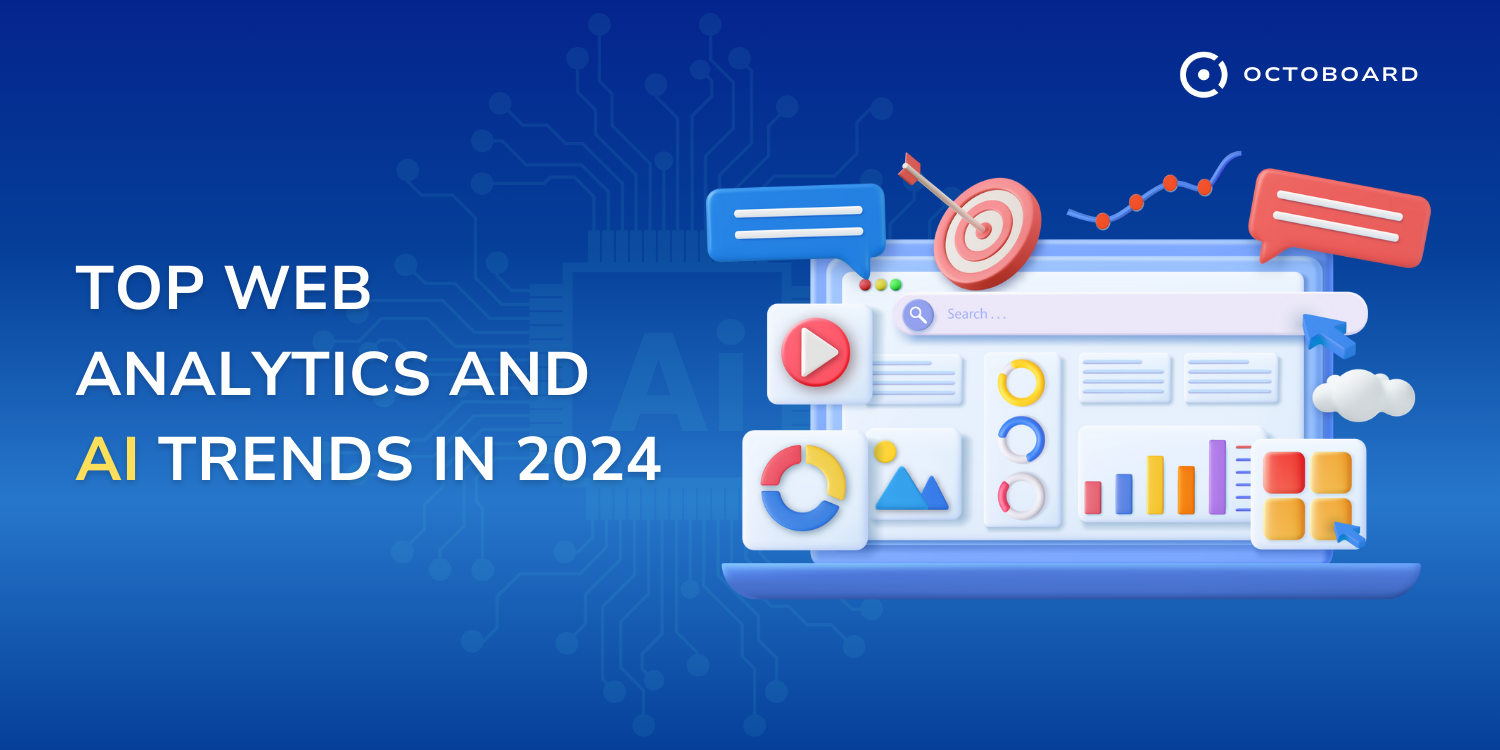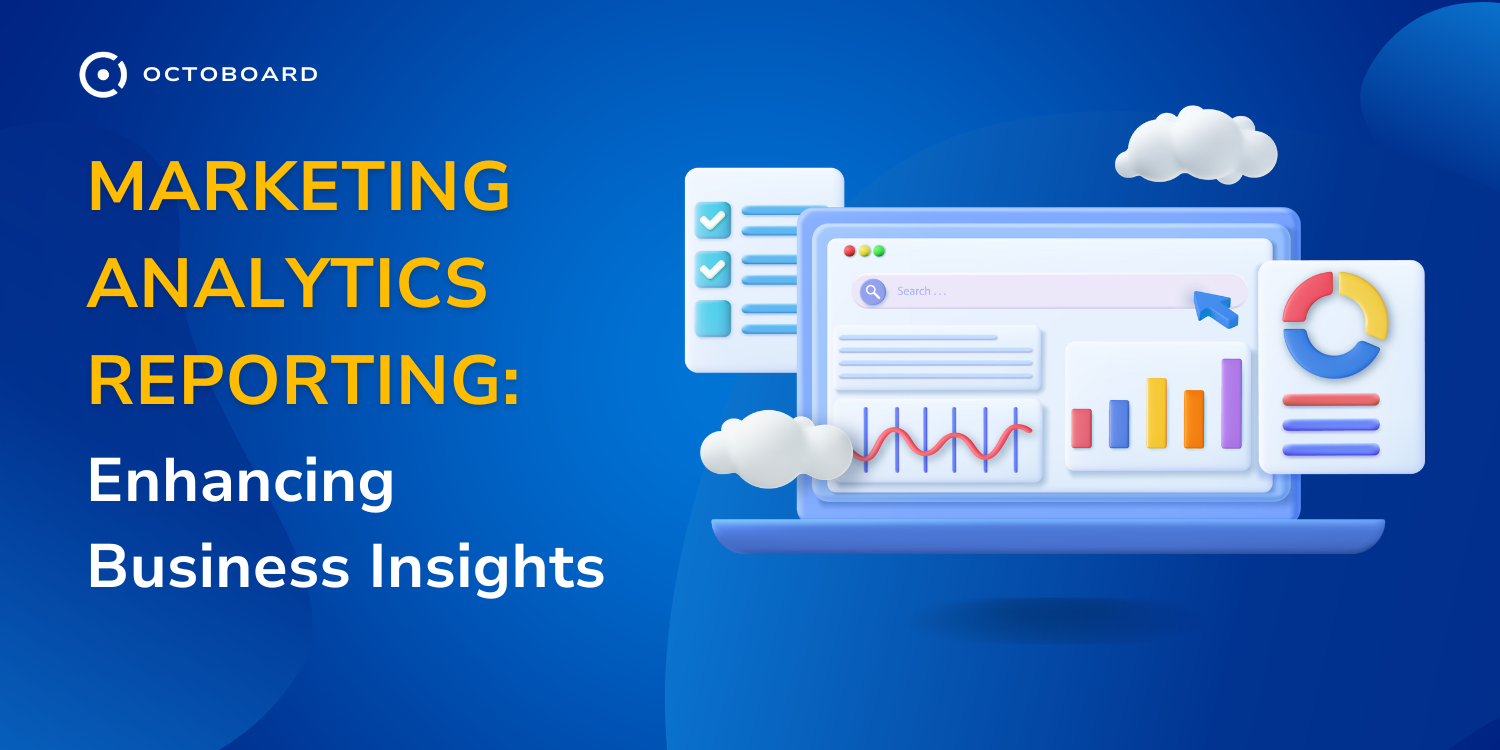Using E-commerce data analytics platform: Analyzing Stripe and WooCommerce data

E-commerce analytics is imperative for online businesses to comprehend performance, customer behavior, and marketing effectiveness. This process involves collecting and interpreting data related to online transactions and customer interactions. By analyzing key metrics like sales revenue, conversion rates, customer acquisition cost, and more, businesses can identify areas to optimize for improved results.
- Streamlining E-commerce Analytics
- Tracking Key E-commerce Metrics
- Simplifying the Role of Stripe and WooCommerce Data
- Leveraging E-commerce Analytics Platforms like Octoboard
- Efficient Capture and Reporting of E-commerce Metrics with Octoboard
- Streamlining Data Trend Analysis with OpenAI Technology
- Simplifying Product Segmentation in E-commerce Analytics
- Enhancing Marketing Effectiveness through Customer Segmentation
- Driving E-commerce Performance with Data Insights
- Simplifying E-commerce Data Analysis through Visualization
- Streamlined E-commerce Data Monitoring and Reporting
- Leveraging AI-Powered Recommendations for E-commerce Growth
- Analyzing User Behavior for Better E-commerce Insights
- Optimizing Conversion Rates with Advanced Analytics
- Leveraging Analytics for E-commerce Success

Octoboard E-commerce Analytics product allows you to build regular E-commerce reports that analyze performance of your online store and share results with your team.
Understanding customer behavior is another crucial aspect of e-commerce analytics. By analyzing data on customer interactions such as website visits, product views, and purchases, businesses can tailor the customer experience, recommend relevant products, and enhance overall satisfaction and loyalty.
E-commerce analytics is also valuable for tracking marketing campaign performance. By analyzing data on website traffic sources, campaign effectiveness, and conversions, businesses can evaluate their marketing efforts and adjust strategies accordingly. This optimization can lead to better targeting of high-value customers and increased return on investment.

Leveraging e-commerce platforms like WooCommerce and Stripe provides businesses with a wealth of data that can be harnessed for analytics. These platforms offer insights into sales, transactions, and customer interactions that, when integrated with e-commerce analytics tools like Octoboard, can provide a comprehensive view of performance as well as capture data trends by using our Open AI trend analysis.
E-commerce analytics plays an important role in helping businesses thrive in the online marketplace by offering valuable insights and opportunities for optimization. By utilizing the right tools and methodologies, businesses can leverage data to unlock their full e-commerce potential and achieve long-term success.
Octoboard - a specialized e-commerce analytics platform - offers features for tracking, analyzing, and reporting on key e-commerce metrics. From real-time monitoring to advanced data visualization, Octoboard equips businesses with the tools necessary for data-driven decision-making and growth.
Monitoring essential metrics is very important for the success of online businesses. By analyzing data related to sales, website performance, customer engagement, and marketing efforts, businesses can make informed decisions to improve their operations and drive growth.
Octoboard offers over 300 real-time Stripe and WooCommerce metrics that can be used in pre-built and custom reports.
Sales data is critical for e-commerce success, providing insights into revenue generation, trends, and customer behavior. Metrics like conversion rates, average order value, and customer lifetime value help companies understand their performance and make necessary adjustments.
Website traffic and engagement metrics are crucial indicators of user interaction with the site. Monitoring metrics such as visits, bounce rate, time on site, and page views helps in optimizing website design, navigation, and content to enhance user experience and conversion rates.
With Octoboard, you can capture your online traffic and combine it with the metrics retrieved from Stripe, WooCommerce and other payment and online store management systems.
Customer acquisition and retention metrics are key to evaluating marketing and customer loyalty strategies. Tracking metrics like acquisition cost, retention rate, and churn rate helps in identifying effective acquisition channels and improving customer retention efforts.
Inventory and fulfillment metrics aid in optimizing inventory management and order fulfillment processes. Metrics such as inventory turnover rate, stockouts, and order fulfillment times help in preventing stockouts, reducing costs, and enhancing customer satisfaction.

Marketing performance metrics play a significant role in assessing marketing campaigns. Metrics like click-through rates, conversion rates, email open rates, and social media engagement help in evaluating the effectiveness of marketing strategies and optimizing resource allocation for maximum ROI.
Tracking key e-commerce metrics helps businesses make data-driven decisions and achieve sustainable growth in the competitive online market. By monitoring and analyzing sales, website, customer, inventory, fulfillment, and marketing metrics, e-commerce companies can identify improvement opportunities, enhance efficiency, and succeed in the digital marketplace.
Stripe and WooCommerce are key players in e-commerce, providing valuable insights into customer behavior, sales trends, and overall performance. Stripe's transaction analytics offers details on purchases, customer demographics, and payment methods. Subscription analytics tracks renewal rates and revenue from recurring payments. In contrast, WooCommerce's product analytics helps identify top-selling products and customer analytics provides insights into customer behavior for targeted marketing efforts.

Integrating Stripe and WooCommerce data into Octoboard offers businesses a comprehensive view of their e-commerce operations. By consolidating data from these platforms, users can analyze sales performance, customer behavior, and key metrics in one dashboard. Octoboard's customizable dashboards and reports provide real-time monitoring, trend analysis, and actionable insights to optimize e-commerce performance.

Understanding Stripe and WooCommerce data is essential for businesses looking to enhance their online store operations. By leveraging Octoboard's features, businesses can track metrics, identify growth opportunities, and make informed decisions to drive e-commerce success.
E-commerce businesses benefit from using analytics platforms like Octoboard. Octoboard provides real-time tracking of essential metrics like sales, website traffic, and conversion rates. Businesses can customize their dashboards to focus on specific metrics and set up alerts. The platform integrates with various e-commerce tools, allowing businesses to consolidate data from multiple channels. Through visualizations like charts and graphs, businesses can quickly grasp their data and make informed decisions. Octoboard automates reporting, saving time and ensuring stakeholders stay informed regularly. The platform prioritizes data security and compliance with industry standards and regulations, offering peace of mind to businesses. By leveraging Octoboard's features, e-commerce businesses can optimize their performance, make data-driven decisions, and drive growth effectively in today's competitive digital landscape.

Octoboard offers comprehensive e-commerce analytics platform, making it easy for businesses to track and analyze key performance metrics. By integrating with popular e-commerce platforms like Shopify and WooCommerce, Octoboard captures data on sales, revenue, and customer behavior in real-time.
Businesses can create custom dashboards tailored to their specific metrics of interest, from website traffic to customer retention. Octoboard's reporting capabilities allow for in-depth analysis and the generation of customizable reports, helping companies identify trends and areas for improvement.

Automated email reporting feature ensure key stakeholders are kept informed, freeing up time for executives and managers. Advanced analytics features, such as AI-powered trend detection, provide deeper insights on customer behavior and market trends. Octoboard uses its own ChatGPT connection. There is no need to have a paid account with OpenAI if you are using Octoboard to monitor your E-commerce trends.
Octoboard enables businesses to create targeted marketing strategies by segmenting high-value customers and adjusting product offerings accordingly. The platform's visualization tools make it easy to interpret complex data and track e-commerce performance towards set goals.
By leveraging Octoboard's advanced analytics and reporting features, businesses can make informed decisions to optimize their online operations and drive growth in the competitive e-commerce landscape.
OpenAI-based tools can efficiently process vast data volumes, uncover insights, and aid in predictive analysis. By leveraging these technologies, businesses can optimize their strategies, tailor offerings to customer preferences, and forecast market trends.
You can simply create an Octoboard account, add your Stripe or WooCommerce data and start receiving ChatGPT data insights in your email or Slack channel.
Analyzing customer behavior helps in personalizing marketing efforts and improving products. This technology's automation capabilities streamline processes, enhancing efficiency and enabling more accurate decision-making. Leveraging OpenAI technology empowers e-commerce enterprises to gain a competitive advantage, drive growth, and ensure sustainable success in the dynamic marketplace.

Product segmentation in e-commerce analytics helps categorize products based on specific criteria. By creating segments, businesses can gain insights into sales performance, target customer groups effectively, and optimize marketing strategies.

Octoboard's features for product and customer segmentation can enhance e-commerce analytics. Businesses can categorize products and customers based on total revenue, repeat purchases, geo location, latest order and a lot more.
Benefits of Product Segmentation in E-commerce Analytics
Product segmentation enables businesses to understand product performance, target marketing efforts, optimize inventory, and analyze pricing strategies.
- Improved Product Performance: Analyze top-selling products and underperforming items to allocate resources effectively.
- Targeted Marketing: Tailor campaigns based on customer preferences within each segment.
- Inventory Management: Monitor stock levels and demand patterns across product categories.
- Price Optimization: Adjust pricing strategies to maximize revenue without sacrificing customer satisfaction.

How Octoboard Enables Product Segmentation for E-commerce Analytics
Octoboard allows businesses to create custom product segments with specific criteria from data sources like Stripe and WooCommerce.
- Custom Segmentation Rules: Define rules based on product attributes like category, price range, and sales volume.
- Automated Data Collection: Real-time updates ensure access to the latest information on product performance.
- Interactive Dashboards: Visualize product segments and key metrics intuitively.
- Integrated Reporting: Comprehensive reports offer insights into sales trends and customer behavior within each segment.

Case Study: Leveraging Product Segments for Growth
A fashion retailer categorizes products into segments based on clothing type, target customers, and price range. By utilizing Octoboard, they can:
- Identify top-selling products within each segment.
- Tailor marketing campaigns based on customer preferences.
- Optimize inventory management by monitoring stock levels.
- Analyze pricing strategies to maximize revenue.

Customer segmentation is a strategic approach used by e-commerce businesses to group customers based on shared characteristics or behaviors. This segmentation enables businesses to tailor their marketing strategies and messages to specific customer groups, ultimately leading to increased engagement and conversions. By analyzing data such as demographics, purchase history, and browsing behavior, businesses can identify patterns and trends that help in creating meaningful customer segments.
Segmenting customers allows for personalized marketing efforts that resonate with individual preferences and needs. Targeting specific customer segments with relevant messages and promotions fosters a more personalized experience, which in turn boosts the likelihood of customers making purchases. For instance, creating targeted email campaigns for customers interested in beauty products with new releases or exclusive discounts can drive sales.
Moreover, customer segmentation helps in recognizing high-value customers who make frequent purchases and are likely to become repeat buyers. By identifying and segmenting these valuable customers, businesses can implement loyalty programs, offer exclusive perks, and provide tailored recommendations to enhance customer retention and foster continued engagement.

Testing and optimizing marketing campaigns become easier with customer segmentation. Businesses can conduct A/B tests on different customer segments to evaluate the effectiveness of messages, promotions, and channels in driving conversions. This data-driven approach empowers businesses to constantly refine their marketing strategies, maximize return on investment, and stimulate growth in their e-commerce operations.
Effective creation of customer segments requires the utilization of comprehensive data analytics tools that provide insights into customer behavior and preferences. Platforms like Octoboard offer sophisticated analytics capabilities that allow businesses to track e-commerce metrics, analyze customer data, and create precise customer segments for targeted marketing strategies. By leveraging these tools, businesses can deepen their understanding of customers, deliver personalized experiences, and drive engagement and conversions successfully.

In essence, customer segmentation is a potent strategy for e-commerce businesses seeking to heighten marketing efficacy and boost revenue. By segmenting customers and delivering personalized marketing campaigns, businesses can foster customer engagement, drive conversions, and unlock growth opportunities in the competitive e-commerce landscape.
Data-driven insights are essential for optimizing e-commerce performance. By utilizing analytics tools like Octoboard, businesses can obtain valuable information on sales, website traffic, and customer behavior. These insights enable companies to identify trends, make strategic decisions, and enhance overall operational efficiency.
Analyzing metrics like sales trends and customer behavior helps businesses recognize both strengths and weaknesses within their e-commerce operations. By understanding these insights, companies can prioritize growth opportunities and improve decision-making processes to boost sales and revenue.

Data insights also aid in identifying patterns in customer behavior and sales trends. Businesses can use this information to tailor marketing efforts, refine product offerings, and enhance the overall user experience. By optimizing these areas, companies can attract new customers, increase sales, and drive growth in their e-commerce ventures.
Moreover, data-driven insights support targeted marketing strategies by analyzing customer data and market trends. Understanding customer segments allows businesses to create personalized marketing campaigns and product offerings that cater to specific consumer needs. This focused approach helps attract new customers, boost sales, and foster business expansion.
Additionally, real-time data monitoring through tools like Octoboard offers businesses immediate access to performance metrics and trends. By tracking website performance and user behavior in real-time, companies can address issues, seize opportunities, and refine strategies to enhance overall performance more effectively.
In essence, leveraging data-driven insights is paramount for e-commerce success. By utilizing analytics tools to track key metrics, identify trends, and make data-informed decisions, businesses can optimize their operations, increase conversions, and improve the customer experience. E-commerce businesses that harness the power of data insights can stay competitive, adapt swiftly to market changes, and drive continuous growth in the dynamic online marketplace.
Data visualization is essential for comprehending complex e-commerce data and making informed decisions. By transforming raw numbers into visual representations like charts and graphs, visualization allows e-commerce professionals to easily identify trends and patterns. Here's why visualization is vital in e-commerce analytics:
Enhanced Data Understanding: Visual tools present data in an easily digestible manner, showing relationships and trends quickly. For example, a line graph can reveal traffic trends over time, highlighting the impact of marketing efforts.
Facilitated Decision-Making: Visualizing data in dashboards empowers users to assess key indicators and make strategic decisions on the spot. This aids in identifying improvement areas and seizing growth opportunities.

Simplified Data Interpretation: Complex e-commerce data can be simplified through visualization, enabling users to spot correlations effortlessly. Elements like pie charts and scatter plots offer a holistic view of data, enhancing comprehension for faster analysis.
Encouraged Data Exploration: Interactive visualizations allow users to explore data dynamically, drilling down into specific metrics for deeper insights. This fosters a culture of data-driven decision-making and continuous improvement.
Improved Communication and Collaboration: Visualization acts as a common language that facilitates communication across teams. By sharing visually engaging reports, stakeholders can align around business metrics and drive transparent decision-making.

In conclusion, data visualization streamlines e-commerce data analysis, enabling users to uncover actionable insights for business growth. By leveraging visualization techniques in e-commerce analytics reports, businesses can enhance data understanding, facilitate decision-making, simplify complex data, encourage exploration, and improve communication. With platforms like Octoboard, e-commerce professionals can harness visualization's power to maximize data potential and thrive in the competitive e-commerce landscape.
E-commerce businesses rely on real-time data insights to make informed decisions and keep up with the dynamic online marketplace. Through Octoboard's real-time monitoring and reporting features, businesses can access immediate analytics on sales, website performance, and customer behavior. Tracking key metrics in real-time allows businesses to respond to changes in their e-commerce performance, enabling them to adapt quickly and drive growth.

With Octoboard, businesses can set up automated alerts for specific metrics to receive immediate notifications when performance deviates from expectations. This proactive approach empowers businesses to take corrective action promptly and maximize their online presence. By analyzing marketing campaign performance as it happens, businesses can optimize their strategies for maximum ROI and stay ahead of the competition.
In addition to real-time monitoring, Octoboard offers advanced reporting tools that visualize key metrics and trends over time. Custom dashboards and reports provide businesses with valuable insights to identify patterns, areas for improvement, and measure the impact of strategic initiatives. Octoboard's reporting capabilities enable businesses to make data-driven decisions that drive growth and enhance the customer experience.
Identifying and addressing issues that impact the customer experience is crucial for e-commerce success. Octoboard's real-time tracking of website performance metrics such as page load times and cart abandonment rates helps businesses quickly identify areas for improvement. By proactively addressing these issues, businesses can increase customer satisfaction, reduce churn, and drive long-term growth.

Overall, streamlined e-commerce data monitoring and reporting are essential for businesses to optimize their online operations and stay competitive. Octoboard's advanced features empower businesses to unlock the full potential of their e-commerce data, make data-driven decisions, and achieve their business goals in today's fast-paced digital marketplace.
AI-powered recommendations play a crucial role in boosting e-commerce success. By utilizing artificial intelligence and machine learning, businesses can offer personalized product suggestions based on customer behavior. These tailored recommendations enhance customer experience, drive engagement, and ultimately increase sales revenue.

The advantage of AI recommendations lies in their data analysis capabilities and ability to deliver personalized suggestions on a large scale. By utilizing advanced algorithms, businesses can create dynamic recommendation engines that continuously learn from customer interactions, ensuring relevant and individualized product suggestions.
AI recommendations enable businesses to optimize their product offerings and pricing strategies by identifying trends and customer preferences. By analyzing data like purchase history and browsing behavior, businesses can tailor their offerings to meet customer needs effectively.
AI recommendations improve cross-selling and upselling opportunities by suggesting complementary products or upgrades based on customer purchase history. This strategy increases the average order value and drives additional revenue per transaction.
The personalized suggestions provided by AI recommendations enhance the overall shopping experience, fostering customer loyalty and encouraging repeat purchases. By delivering relevant and timely suggestions, businesses create a seamless shopping journey that resonates with customers.
AI recommendations help businesses target high-value customers efficiently by segmenting the customer base and tailoring marketing campaigns to specific segments. Analyzing data such as customer lifetime value and purchase frequency empowers businesses to implement targeted strategies that maximize marketing effectiveness.
Integrating AI-powered recommendations into e-commerce analytics equips businesses with a competitive advantage in today's digital landscape. By harnessing the potential of AI and machine learning, businesses can drive growth, boost sales revenue, and cultivate long-term success through enhanced customer experiences and optimized strategies.
Understanding user behavior is key for e-commerce success. Analyzing data on how users interact with your site provides valuable insights to enhance the user experience and boost conversions.
Data analysis helps track user browsing patterns, click-through rates, time spent on pages, products viewed, and cart activity. By scrutinizing this data, you can spot trends and identify areas needing improvement in the user journey to optimize sales.

Website analytics tools offer a wealth of information about user interactions, including traffic sources, page views, bounce rates, and conversions. Segmenting and analyzing this data unveils high and low performing pages, guiding enhancements for a smoother user experience.
Customer feedback and reviews are another vital data source for understanding user preferences and pain points. Analyzing this feedback informs targeted improvements to enhance overall customer satisfaction.

Data analysis also aids in evaluating the effectiveness of marketing campaigns by monitoring metrics like click-through rates and ROI. This insight enables optimization of marketing strategies for better results.
Tracking external factors such as seasonality and market conditions and their impact on user behavior helps in adapting strategies and offerings to align with changing consumer preferences and trends.
Data analysis plays a crucial role in understanding user behavior for e-commerce success. Leveraging data-driven insights helps in identifying improvement opportunities, personalizing the customer experience, and boosting conversions. By incorporating the right tools and techniques, businesses can gain a deeper understanding of their customers to create engaging experiences that foster customer loyalty and drive growth.
Conversion Rate Optimization (CRO) is paramount for e-commerce success. By analyzing user behavior and tracking key metrics, businesses can improve website performance and increase conversions. Advanced analytics tools like Octoboard provide valuable insights into user interactions, helping identify conversion roadblocks and optimize the user experience.
Understanding user behavior through analytics is crucial for e-commerce businesses seeking to enhance conversion rates. By tracking metrics such as bounce rate, time on site, and conversion funnel drop-off points, businesses gain valuable insights to make data-driven decisions.
Identifying conversion obstacles is essential for improving conversion rates. By pinpointing issues like high bounce rates or a complex checkout process, businesses can make targeted optimizations to boost conversions. A/B testing allows businesses to compare different page variations and determine the most effective design changes.

Personalization is a powerful strategy for increasing conversions. By leveraging data to personalize product recommendations and marketing campaigns, businesses can engage users on a personalized level and drive conversions. Continuously monitoring metrics and making data-driven adjustments is vital for ongoing conversion rate optimization.
Optimizing conversion rates requires a holistic approach that combines analytics insights with targeted optimizations. By leveraging advanced analytics tools and strategies, e-commerce businesses can refine their websites, enhance the user experience, and drive revenue growth over time.
Analyzing data is essential to understading customer behaviors and optimizing e-commerce performance for growth and profitability. By employing analytics, businesses can understand their customers, enhance customer experiences, boost conversions, and drive revenue.
E-commerce thrives on data analytics, used to monitor website activity, sales performance, user behavior, and marketing campaigns. Measuring key e-commerce metrics like website traffic, conversion rates, average order value, and customer lifetime value provides deep insights into performance and areas for enhancement. With tools like Octoboard, e-commerce entities can track and report on these metrics in real-time to refine their strategies promptly.
Analytics offer invaluable insights into customer behavior and preferences. By analyzing data on demographics, purchase history, and browsing habits, companies can create customer segments and customize marketing initiatives to target specific groups effectively. Personalizing offers or promotions to high-value customers, for instance, can elevate customer retention and drive more sales.

Analytics also play a crucial role in monitoring and enhancing conversion rates. By assessing user behavior on websites, businesses can pinpoint conversion barriers and make necessary adjustments to improve the user experience. Whether it’s enhancing product recommendations, streamlining the checkout process, or optimizing site performance, analytics empower businesses to raise conversion rates and drive sales.
Visualization is key in e-commerce analytics as it simplifies the interpretation and communication of complex data. Creating visually engaging dashboards and reports enables quick identification of trends, patterns, and irregularities across data, facilitating swift, informed decisions. With Octoboard's strong visualization capabilities, businesses can craft custom dashboards offering a comprehensive snapshot of their e-commerce performance and KPIs.

Leveraging analytics for e-commerce success is essential for businesses striving to remain competitive in the digital landscape. Through data-driven insights, businesses can optimize operations, improve customer experiences, and boost growth and profitability. With tools like Octoboard, e-commerce entities can unlock the potential of their data to make smarter decisions and achieve success in the ever-evolving world of online retail.

